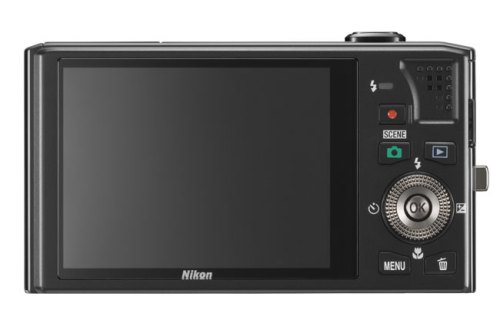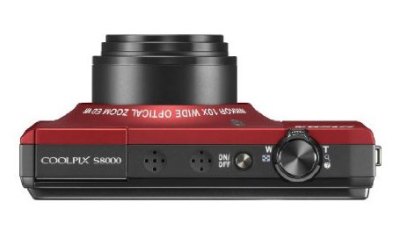“Nikon’s S8000 digital camera snaps superb 14-megapixel still shots from a compact, attractive body, but at less than one shot per second, you had better not be in a hurry.”
- 10x zoom (30-300mm)
- Takes very nice stills
- Quality 3-inch LCD
- Superior optical image stabilization
- Pokey less than 1 fps shooting
- Prefer wider-angle (26mm not 30mm)
- No manual adjustments other than white balance, ISO
- Poor video quality
 Introduction
Introduction
There were no real surprises with Nikon’s new Coolpix digicam line-up
–five of the seven 2010 models take HD videos. The digicam we’re reviewing–the 14.2-megapixel S8000–captures stereo 720p HD clips at 30 fps. Yet the last time we looked, the Coolpix and its ilk are cameras, so still quality should be paramount. Let’s see how this package adds up…
Features and Design
The Coolpix S8000 is a very attractive camera with sculpted lines around the 10x zoom lens. We had an all-black model, but it’s also available in red, bronze and champagne silver. Nikon claims this is the thinnest camera in its class at 1.1 inches thick, but that’s a moving target and competitors are at most just a fraction fatter. Still it is thin, given the potent zoom. The digicam measures 4.1 x 2.3 x 1.1 (WHD, in inches) and weighs 6.5 ounces with battery and card. You’ll have no issues carrying this around with you all the time.
Along with the usual logos and decals, the front has a nice textured surface on the left side; the thumb rest on the back has a nub-like surface. It felt just right in our hands but you know the drill—do your own hands-on before you buy this or any camera. Also on the front is an AF Assist lamp, a great help for fast focusing. There is no visible flash as it’s an auto pop-up type like many Canon PowerShots like the SX210 IS. Nikon claims the S8000 has a “wide” lens but with an opening focal length of 30mm it’s not nearly as wide as many Canon, Sony and Panasonic models. In our book 25-28mm is true wide angle but 30mm isn’t too bad and you’ll grab nice landscapes and portraits. The 300mm on the tele end makes this a good choice for travelers.

On the top is the shutter surrounded by a wide/tele toggle, tiny on/off button, stereo mics and the pop-up flash. On the right side of the Made In China camera is the compartment for the mini HDMI out while USB-A/V out and the battery/SDHC card slot is on the bottom along with a tripod mount. Definitely use Class 6 or better cards for best results. All in all, the S8000 is a nicely designed camera you’ll easily use after 15 seconds of setup.
What’s In The Box
The Coolpix S8000, battery/charger, USB and A/V cables, strap and 20-page Quick Start guide as well as a 172-page User’s Manual. The CD-ROM has the Nikon Software Suite featuring Nikon Transfer, ViewNX, ArcSoft PanoramaMaker 5, QuickTime and access to my Picturetown which offers 2GB of free online storage.
Performance and Use
This is truly an aim-and-forget camera—there’s only an Auto mode with very limited options. If you want to adjust shutter speeds and apertures this camera is not for you. Since we’ll always go with the flow, we put in the camera in Auto at maximum resolution and best compression. The 14-megapixel camera grabs 4320×3240 pixel files as well as 720p HD clips.

For the most part the 3-inch screen held up well but there were issues with direct sunlight. Unfortunately, Nikon makes it somewhat difficult to adjust the display (multiple menu steps). It would be far better if there was a dedicated key to boost brightness in those instances.
We took many shots of blooming flowers and other subjects over the course of several weeks. Once done, files were downloaded to a PC, reviewed closely on a monitor (100%+) and 8×10 prints made.
Overall the Nikon S8000 captured very high-quality stills with accurate colors and practically no purple fringing at extreme telephoto. Sharpness was also very good but not tack sharp as a D-SLR but that’s way too much to ask for from a point-and-shoot. Although the 10x zoom is a plus, macro close-ups were outstanding, among the best we’ve seen from a digicam. The Creative Slider function is just O.K. as it lets you adjust brightness, vividness and hue. Actually we feel it takes away from the straight ahead results you’ll get in Auto.

As noted the S8000 takes 1280x720p videos by tapping the red dot on the back. It’s somewhat limited since there’s no optical zoom available, just 2x digital so you should frame your scene before you hit the button. Quality on a 50-inch plasma using HDMI was poor and the digital zoom just made the “blocking effects” even worse. There simply is no comparison to the videos made with this camera versus the recently reviewed Editor’s Choice Sony TX7. The Nikon’s clips might pass muster on YouTube but that’s a stretch.
Conclusion
The Nikon Coolpix S8000 is a very good, lightweight 14MP camera that takes high-quality stills. It’s extremely simple to use and has a versatile 10x focal length of 30-300mm, making it a good choice for vacationers or anyone who wants a solid digicam at hand. Unfortunately its HD video quality is very low-definition as Sony and Panasonic have left Nikon in the dust. At around $265 at legit online dealers it’s a bit on the pricey side but if you’re looking for a quality camera—i.e. a device for capturing photographs–keep the S8000 in mind.
Highs:
- 10x zoom (30-300mm)
- Takes very nice stills
- Quality 3-inch LCD
- Superior optical image stabilization
Lows:
- Pokey less than 1 fps shooting
- Prefer wider-angle (26mm not 30mm)
- No manual adjustments other than white balance, ISO
- Poor video quality


 Introduction
Introduction

